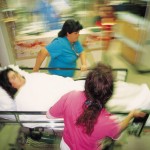 Patients fall into endless space everyday….Black Holes are the side effect of modern healthcare. In the early 20th century Black Holes in outer space were seen as a phenomena where matter was absorbed and nothing could escape. If you, a loved one, or even an employee has ever had to deal with a health issue that requires coordination between various professionals it is likely you understand the Black Hole analogy all too well.
Patients fall into endless space everyday….Black Holes are the side effect of modern healthcare. In the early 20th century Black Holes in outer space were seen as a phenomena where matter was absorbed and nothing could escape. If you, a loved one, or even an employee has ever had to deal with a health issue that requires coordination between various professionals it is likely you understand the Black Hole analogy all too well.
A recent Washington Post article, “Many doctors, too little communication”,hits on a key factor creating Black Holes, the lack of care coordination. It takes an interdisciplinary team to address multiple needs in patient care. Doctors, nurses, pharmacists, therapists and support staff each play a role in patient care. But, without a patient centered plan of care on which each member of this team is focused, Black Holes suck patients into the vortex daily.
Care coordination is expected to solve this problem.
Care coordination is the new buzz-word in healthcare. If we are lucky the multiple players driving healthcare change will craft a care coordination framework around patients. However, with so much change underway at this time, how this will be done is unclear. It will take more than “fixes” in the health system to solve the problem of Black Holes and all the pain, suffering, death and enormous financial cost they bring EVERY Day to real people.
There is good news however., the concept of care coordination. It is time for consumers, clinicians, and employers to come together around this concept. One way to do this is to foster the development of 21st Century Patient thinking.
What does 21st Century Thinking mean for patients?
It means healthcare consumers develop the skills to be active partners with the clinical team guiding their care.
This requires a willingness to do three things:
- Ask questions and expect answers that are clear and based on good science
- Learn as much as possible about their medications, treatments and diagnosis
- Engage in shared decision making
“The idea that a “good patient” is someone who is afraid to ask question or request something they need is outdated and dangerous thinking.” L. Sams
Leave a Reply